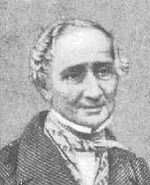Anthony Norris Groves
| Anthony Norris Groves | |
|---|---|
 |
|
| Born | 1 February 1795 Newton Valence, Hampshire, England |
| Died | 20 May 1853 Bristol, England |
| Nationality | British |
| Occupation | Dentist, Missionary, Author |
| Spouse(s) | Mary Bethia Thompson, Harriet |
Anthony Norris Groves (1 February 1795 – 20 May 1853) was an English Protestant missionary and the "father of faith missions". He launched the first Protestant mission to Arabic-speaking Muslims, and settled in Baghdad, now the capital of Iraq, and later in southern India. His ideas influenced a circle of friends who became leaders in the Plymouth Brethren. Among these were JN Darby, JV Parnell (Lord Congleton), and George Müller, who had married Groves' sister Mary.
The significance of Groves lies in his desire to simplify the task of churches and missions by returning to the methods of Christ and his apostles described in the New Testament. As a missionary, his goal was to help indigenous converts form their own churches without dependence on foreign training, authorisation or finance. His ideas eventually found wide acceptance in evangelical circles.
Groves was born in Newton Valence, Hampshire, England and was the only son in a family of six. His father was a businessman and the family were Anglicans, attending church in Fulham. Having trained as a dentist in London, he set up practice in Plymouth, at the age of 19. Two years later he married his cousin Mary Bethia Thompson, and moved to Exeter.
In 1826, while continuing his dentistry in Exeter, he enrolled as an external student of theology at Trinity College, Dublin, with a view to ordination in the Church of England and appointment with the Church Missionary Society. His study of the New Testament led him to believe that the practices of the early church should be considered a model for every age and culture, and this caused him to consider withdrawing from Trinity College, from the CMS, and from the Anglican communion on his wife's advice. However, he had already laid the money aside and considered that he would be thought fickle if he suddenly abandoned his application. The morning before he was due to depart for Dublin, however, he was awoken by a noise and, on investigating, found that a burglary had taken place. Two packets of money were in his drawers – one containing £40 for the Irish trip and the other containing £16 for taxes: only the packet containing £40 was taken. Groves took this as a sign from God that he was not to go to Dublin and thereafter he gave up the idea.
...
Wikipedia
